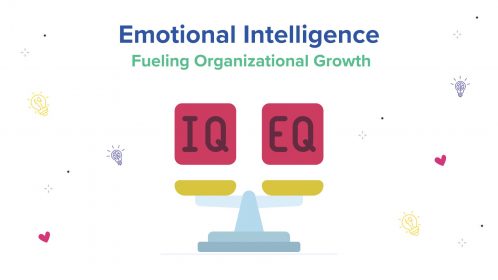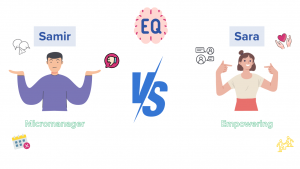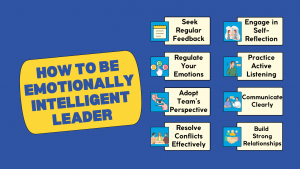
Intelligence quotient matters in the workplace, but have you ever wondered if emotional intelligence is as important? To answer this question, you need to answer this one first: What sets apart exceptional leaders from average ones?
Who Would You Choose
Imagine two teams, each with a different leader.
Team A’s Leader, Samir: Samir is always stressed, micromanaging every task. Communication isn’t in the vocabulary, deadlines are missed, and team morale is low. The team feels overwhelmed and undervalued, leading to decreased productivity and high turnover.
Team B’s Leader, Sara: Sara, on the other hand, fosters a collaborative and supportive environment. She empowers her team, delegates tasks effectively, and provides clear guidance. With open communication and regular check-ins, her team is motivated, efficient, and consistently delivers exceptional results.
Who would you rather work for?
Samir, the micromanager, or Sara, the empowering leader? The answer is clear. Effective leadership, characterized by empathy, clear communication, and a focus on team development, is crucial to a thriving workplace.

What is Emotional Intelligence
Emotional intelligence, often referred to as EI or EQ, is more than just understanding your own emotions. It’s the capacity to comprehend, control, and constructively utilize emotions. It involves recognizing and understanding not only one’s feelings but also the feelings of others, leading to better relationships, decision-making, and problem-solving.
It might seem like a new concept that has become popular nowadays, but it’s been studied for a long time.
A Brief History of Emotional Intelligence Term
The term “emotional intelligence” became popular in the 1990s, but the importance of emotions in human behavior has been recognized for centuries, with philosophers like Aristotle and Confucius emphasizing self-awareness and its impact on decision-making. The formal history of the term began in the 1950s when the author Dorothy Van Ghent identified high emotional intelligence (EQ) in Jane Austen’s characters.
In 1990, social psychologists and researchers Mayer and Salovey developed a formal theory of emotional intelligence. Their work focused on defining emotional intelligence and understanding how it manifests in our behavior and thoughts. Although their research was groundbreaking and they published their theory in a book in 1990, Daniel Goleman’s 1996 book “Emotional Intelligence: Why it can matter more than IQ,” popularized the concept, bringing it to a wider audience and solidifying its place in modern psychology.
Since then, emotional intelligence has gained recognition across various fields, including education and business, inspiring research into its measurement and the development of training programs. Despite ongoing debates regarding certain measurement methods, there is widespread agreement that emotional intelligence is a valuable asset for both individuals and organizations.
Emotions in the Workplace
Some think that the workplace is no place for emotions, employees just do their job and leave. But that’s not real; employees spend from 30 to 40 hours weekly at work, interacting with other colleagues and managers. How can someone suppress their emotions for six to eight hours every day?
In reality, we experience a wide range of emotions in the workplace, from joy and excitement to sadness and anxiety. These emotions can influence our productivity, motivation, and overall job satisfaction.
While maintaining professionalism is important, acknowledging and managing our emotions can lead to healthier work environments and stronger relationships with colleagues. By understanding and addressing our emotional needs, we can create a more supportive and productive workplace for everyone.
Not everyone possesses high emotional intelligence, though. Some may struggle to identify and respond appropriately to emotions.
Lack of EQ indicators
At the workplace, how employees act, react, and express themselves, says much about their EI. Those with low emotional intelligence may struggle to communicate effectively, listen attentively, receive feedback well, be unable to understand social clues, or understand and relate to the emotions of others. They might also have difficulty self-reflecting, managing stress, or controlling their emotions. This makes it challenging to work in teams and build and maintain healthy colleague relationships, as they may tend to isolate themselves or react aggressively or unprofessionally in conflicts.
A variety of factors, including genetics, upbringing, social exposure, emotional trauma, mental health, and cultural factors can influence low EI. While some people may naturally have higher or lower EQ, it’s important to know that it can be developed through accepting guidance, conscious effort, and practice.
Emotional intelligence Components
Psychologist Daniel Goleman developed an effective framework for emotional intelligence (EI) that questions the notion that success is solely determined by intellectual ability. Goleman argues that both our personal and professional lives depend significantly on our emotional intelligence. He therefore divides EI into five essential components:
1- Self-Awareness
It is the cornerstone of emotional intelligence. It entails being aware of one’s own feelings and their impact on behavior. Self-aware individuals are able to understand their strengths and weaknesses, and they have realistic self-assessments.
2- Self-Regulation
Once one becomes aware of their emotions, they can move to this component, which is the ability to manage one’s emotions effectively. Emotionally intelligent people can control their impulses, resist negative urges, and adapt to change. They are resilient and can bounce back from setbacks.
3- Motivation
The drive to achieve goals and stay focused is motivation. Emotionally intelligent individuals are naturally motivated and can find inspiration even in challenging situations. They are persistent and don’t give up easily.
4- Empathy
It’s the capacity to understand and share the feelings of others. Emotionally intelligent people can put themselves in someone else’s shoes and respond with compassion and understanding. They are able to distinguish between phony and genuine. Through their tone and facial expressions, they are able to recognize the emotional shifts of others.
5- Social Skills
Being able to reach the fifth component indicates a high level of emotional intelligence. Individuals are skilled at building and maintaining strong relationships. They can settle disagreements and conflicts because they are skilled communicators and negotiators.
These five components showcase that EI is no longer just an individual trait but a collective organizational asset that can enhance collaboration, communication, and adaptability.
Why Emotional Intelligence Matters in the Workplace
Investing in emotional intelligence has the potential to significantly impact organizations. Here are several explanations for why (EI) matters in the workplace and the potential impact:
- Better Leadership
High EI leaders are better at leading teams, inspiring creativity, and delivering outcomes. Although IQ and technical proficiency are crucial, a leader’s emotional intelligence frequently distinguishes exceptional leadership from mediocrity. Under pressure, a leader who is self-aware and emotionally stable may remain cool and make thoughtful decisions. Furthermore, they are more likely to motivate and inspire their teams through empathy and excellent communication, fostering trust and respect.
- Improved Team Collaboration
Teams made up of individuals with high EI are better at collaborating and resolving conflicts. Empathy plays a key role in how team members work together. When individuals understand and consider each other’s emotions and perspectives, they are more likely to cooperate, share ideas, and contribute to collective goals.
- Effective Communication
In the workplace, communication involves more than just sharing information; it also involves comprehending the feelings that underlie that information. Leaders and employees with high EI can communicate more effectively because they are attuned to both verbal and non-verbal cues. They adjust their message to emotionally connect with others because they are aware of others’ emotional needs.
- Enhanced Job Performance
There’s a direct link between emotional intelligence and job performance. Studies have shown that individuals with high EI tend to perform better, particularly in jobs that require interpersonal interactions, leadership, and problem-solving. Employees with strong emotional intelligence can handle stress better, adapt to change, and are more resilient in the face of challenges.
How to be Emotionally Intelligent Leader

Work on improving the five components of EI. Here are some practical tips:
– Seek Regular Feedback: Take note of both positive and constructive criticism to gain the full picture of your leadership style.
– Engage in Self-Reflection: Set aside time for personal reflection. Whether through journaling or quiet moments of introspection, consider how your emotions and actions affect your leadership.
– Regulate Your Emotions: Recognize your emotional responses and understand how they influence your leadership approach. Focus on managing stress and controlling your reactions to make more thoughtful decisions.
– Practice Active Listening: Focus on truly understanding your team’s concerns and perspectives, rather than just hearing their words. This will help build trust.
– Adopt Your Team’s Perspective: Try to view situations from your team’s point of view. Doing so strengthens communication and helps you connect with your team on a deeper level.
– Communicate Clearly: Ensure that you articulate your goals, expectations, and vision in a way that everyone can easily understand. This reduces confusion and keeps everyone aligned.
– Resolve Conflicts Effectively: Develop the ability to handle conflicts within the team constructively. This shows leadership and creates a more harmonious work environment.
– Build Strong Relationships: Take time to nurture connections with your team members. Strong relationships boost morale and motivate your team to excel.
Focusing on these key areas can greatly enhance your emotional intelligence as a leader. By committing to consistent self-improvement and reflection, you can become a more effective, inspiring leader. Witnessing improvement is your cue to cultivate the same growth within your team.
How to Cultivate Emotional Intelligence in the Workplace
To cultivate (EI) throughout the workplace, leaders can implement a variety of strategies that promote self-awareness, empathy, and effective communication. Here are several actionable approaches that can help leaders enhance and spread emotional intelligence across their organization:
- Create an Emotionally Supportive Culture: Foster open communication and feedback to help employees feel safe expressing emotions and ideas.
- Foster a Growth Mindset: Encourage continuous learning and self-reflection, enabling employees to enhance their emotional intelligence over time.
- Lead by Example: Demonstrate empathy, self-awareness, and emotional regulation to set a positive example for the team.
- Recognize and Reward EI: Acknowledge employees who display high EI through formal recognition or praise.
- Encourage Collaboration: Promote teamwork to help employees develop social skills, empathy, and communication through group work.
- Provide Mentoring and Coaching: Pair employees with EI-skilled mentors for guidance, feedback, and emotional development.
- Integrate EI in Performance Reviews: Make emotional intelligence a key factor in performance evaluations to emphasize its importance.
Conclusion
Success in the workplace is greatly influenced by emotional intelligence, which enables leaders to motivate, communicate, and build stronger teams. By cultivating the essential elements of emotional intelligence (EI)—self-awareness, self-regulation, motivation, empathy, and social skills—leaders may improve their own efficiency and foster a cooperative, encouraging environment. Fostering EI not only boosts individual performance but also improves team dynamics, morale, and productivity. Prioritizing emotional intelligence helps leaders create a work atmosphere where people feel valued, understood, and inspired to perform well, which eventually leads to long-term success for both the business and its members.
EI is essential to a thriving company culture. When both leaders and employees prioritize EI, it boosts teamwork, creates a positive work environment, and improves overall performance.
For more on the significance of company culture, check out this article: Culture Code: Unleashing Workplace Magic – 8WORX